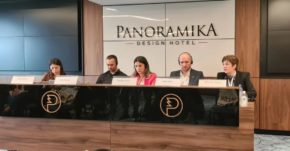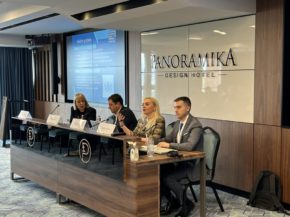PANEL DISCUSSION ON FREEDOM OF INFORMATION IN THE WESTERN BALKANS IN 2022

At today’s regional panel discussion organized by the Balkan Research Network (BIRN) “Freedom
of Information in the Western Balkans in 2022”, journalists, civil society organizations and
institutions from the Northern Macedonia, Serbia, Kosovo and Montenegro shared their
experiences from the implementation of free access to public information. The director of the
Agency for the Protection of the Right to Free Access to Public Information, Plamenka Bojcheva,
took part as a panelist in the discussion.
Furthermore, the Report on “Free access to information in the Western Balkans in 2022:
“Unanswered requests” institutional monitoring-Transparency and proactivity-Third year” was
presented at the panel discussion. It was prepared by BIRN network journalists from North
Macedonia, Albania, Bosnia and Herzegovina, Kosovo, Montenegro, and Serbia.
From January to December 2022, BIRN journalists submitted 376 requests for public
information. Only 134 requests were fully answered, 15 were partially answered, while 14
requests were rejected. More than half of the requests, 213, were not answered at all (due to
the “silence of the administration”), which reflects the lack of transparency of public institutions
and their proactivity.

At the panel for free access to information, Director Bojcheva emphasized that the main
problem in North Macedonia is the silence of the administration and overcoming it represents
the Agency’s main challenge in its ongoing work.
“When an applicant submits a request for access to public information, the institutions do not
respond within the legally prescribed deadline. Our aim is to change this with regular training
held for the officials that receive the requests. Political will plays a very important role in this
issue, too. What we, as an Agency, are trying to achieve even though we lack resources, is to
overcome that issue by building institutional standards,” said Bojcheva.
The other panelists pointed out that the institutions prefer to remain silent or partially answer
to the requests, but do not always give full access to the requested information, especially to
requests submitted by journalists.

The second part of the panel discussion was dedicated to the Open Government Partnership,
the problems and perspectives, where the panelists pointed out that the three most important
challenges facing the Balkan countries are combat against corruption, lack of open civil space,
and institutional trust. It was also emphasized that this process should not depend on the
personal commitments of a limited number of people, both in the institutions and among the
representatives of the civil sector, nor on the political will of the authorities.

